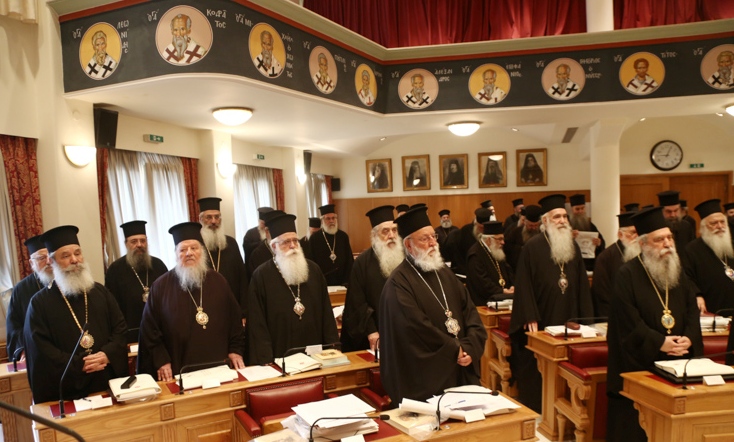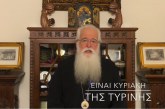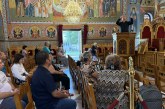
Excerpts from the intervention of His Eminence Metropolitan Ignatius of Demetrias, Chairman of the Synodal Committee for Inter-Orthodox and Inter-Christian Relations During the Extraordinary Session of the Holy Synod of the Church of Greece
(12th October 2019)
Your Beatitude Archbishop of Athens and all Greece, Brothers in Christ,
The Synodal Committee for Inter-Orthodox and Inter-Christian Relations, which I am honored to chair, explicitly followed the mandate of the Standing Holy Synod of the Church of Greece. In this light, I would like to summarize the prevailing perspectives during the Committee’s discussions, drawing your attention to the following five points:
- The Ukrainian Orthodox people
As His Beatitude pointed out in his opening address, we are concerned with the Orthodox people of an independent state, which Ukraine constitutes today. We are dealing with millions of Orthodox faithful, who have historically suffered from policies of either Poland or Russia. Therefore, our focused discussions on the validity of Ordinations and the stance of Bishops must take into account the existence of millions of believers for whom we are responsible.
As the Archbishop of Athens and All Greece underlined, shortly after the collapse of the Soviet Union and the declaration of independence of Ukraine, the latter requested that its local Church be granted the status of autocephaly, in accordance with the pattern of the other Autocephalous Churches. This original request was a genuine one. The fact that it was co-signed even by the current Metropolitan Onufriy is a strong indication that it was a comprehensive request, in the sense of reflecting the desire of the entire people and the hierarchy, so that they would achieve independence from subservience to the Russian hierarchy. Unfortunately, this general request was not answered adequately and the issue remained pending. Nevertheless, we are dealing with an independent Ukrainian state, a people with a particular identity, to which the Orthodox faith has also contributed.
- The role of the Russian Orthodox Church
I think that it is also appropriate to explore the role of the Russian Orthodox Church. And I insist on the term ‘Russian Orthodox Church’, inasmuch as experience has unfortunately demonstrated that our brothers give priority to the adjective ‘Russian’ over the adjective ‘Orthodox’. Regretfully, this is a reality that has been already observed since the fall of Constantinople. In fact, while the Russian Orthodox Church had every opportunity to resolve the issue by taking steps towards autocephaly, or at least by proposing a solution that would be acceptable to the Ukrainian people, it sadly failed to do so. Despite a long-lasting dialogue of nearly thirty years on the matter, the Russian Orthodox Church did not want to provide any solution. Meanwhile, the Ecumenical Patriarchate had also contributed to this dialogue in an effort to show its support. However, after Russia’s invasion of Crimea, all of these efforts collapsed. Today, no one believes that the Russian Orthodox Church could provide any solution that would prove satisfactory to the Ukrainian people. Such a view clearly belongs to the past. No solution will ever emerge from that side.
Indeed, not only did the Russian Orthodox Church fail to present any solution, but its attitude during the preparatory process for the Holy and Great Council of 2016 was moreover completely negative. As we all know, autocephaly was among the questions discussed during this preparatory process. Thus, in the 1980s, the Ecumenical Patriarchate even appeared to consent to a relativization of its own privileges. Accordingly, adhering to a strict process, the Ecumenical Patriarchate requested pan-Orthodox consensus for the granting of autocephaly.
During the pre-conciliar meetings leading up to the Holy and Great Council of Crete, we were asked to address the question of signatures consenting to autocephaly. There was no further discussion on the text itself, which had already been agreed upon. This was without a doubt precisely the point that demonstrated the contention of the Russian Orthodox Church and its obsession with refusing the Ecumenical Patriarchate’s proposal. The proposed process followed the precedent of granting autocephaly to the Church of Greece and adopted the terms ‘determines’ and ‘codetermines’, signifying that the decision is ‘determined’ by the Ecumenical Patriarch and ‘codetermined’ by the rest of the Primates.
We attempted to explain to the Russian Orthodox representatives that once the Ecumenical Patriarch had signed the decision, it could not be questioned. On the contrary, Autocephaly would already have been granted. Nevertheless, the term ‘codetermine’ still implies a powerful action because it indicates participation in the actual decision. Nevertheless, the persistent contentiousness of the Russian delegation was inconceivable. Allow me to share with you that I personally reminded the senior representative of the Russian Orthodox Church, ‘The Ukrainian issue is at hand. Do you not see this? Can you not comprehend what will happen?’ In response, he invoked his Patriarch’s insistence that he should not retreat from his position on this matter. I am not quite sure whether his claim was legitimate after all. Today, it might even be questioned.
The Russian opposition arises in the context of the international theological dialogue between the Orthodox Church and the Roman Catholic Church. In this regard, it emanates from the unwillingness on the part of the Russian side to accept any concept of primacy in the Eastern Church. This is the heart of the problem. For it seems that the representatives of the Russian Orthodox Church believe that, if the Ecumenical Patriarch had signed [the Tomos of] Autocephaly in the proposed manner[1] during the process of granting autocephaly, then they would somehow accept that ‘there is a Primate’. This remains a problematic point for the Russian Orthodox Church.
As a result, the question of granting autocephaly was not discussed at the Holy and Great Council of 2016. Had it been discussed there, there would have been no issue today. Not only was it not included in the agenda, but the Russian Orthodox Church also chose not to participate in the Council, invoking the absence of the Patriarchate of Antioch. We believe that it could in reality have also played a part in Antioch’s participation in the Council. If the Russian Orthodox Church had participated in the Council, we firmly believe that it would have been able to ensure and record in the proceedings the pledge of the Ecumenical Patriarch not to proceed with granting autocephaly without its consent.
- The Ecumenical Patriarchate and its obligation
The Ecumenical Patriarchate considers that it was obligated to take action. With very few exceptions, everybody recognizes that it had and still has the right to grant autocephaly, a privilege that the Holy and Great Council certainly did not deny. The Ecumenical Patriarchate is concerned about the ecclesial and spiritual life of the faithful that I mentioned. For that reason, it provided a solution to a problem that could not otherwise possibly be solved. It acted in a particular way, because this is precisely the ministry of the Patriarchate, its task within Orthodoxy.
Granting autocephaly is a prerogative of the Ecumenical Patriarchate, which in the case of Ukraine does not negate the ecclesial entity headed by Metropolitan Onufriy and the Russian Orthodox presence in Ukraine. The status of these does not change; they are neither excommunicated nor led to schism. The Ecumenical Patriarchate has not broken communion with them. On the contrary, it is they who have broken communion with it. The Ecumenical Patriarch continues to commemorate Patriarch Kirill according to the diptychs. Thus, he continues for his part to be in communion with Onufriy, while at the same time offering the possibility of ecclesial communion to the Ukrainians belonging to the Ukrainian Orthodox Church. No one can dispute this prerogative of the Ecumenical Patriarch.
- The Church of Greece and its unity
Let us turn now to our own Church of Greece. Herein lies the most vital point, Your Beatitude. I agree with you when you cite Article 3 of the Greek Constitution [which concerns relations between Church and State] that we safeguard and do not wish to change.
As the President of the Hellenic Parliament has rightly pointed out, Article 3 does not merely concern the relationship between State and Church, but it also relates to the unity of our Church with the Ecumenical Patriarchate. This is a unity that we cannot call into question or permit to be jeopardized in any way because it involves the unity of the Body of our Church and our hierarchy, especially since a considerable number of our hierarchs in the so-called ‘New Lands’ belong spiritually to the Ecumenical Patriarchate of Constantinople and only administratively to the Church of Greece. We should never become embroiled in a conflict with the Ecumenical Patriarchate over the Ukrainian issue because this would lead to our own division, our own problematic relationship with the Ecumenical Patriarchate. Why would we ever do that?
- Geopolitical developments and national matters
Without doubt, the current situation also has geopolitical dimensions. We recognize our own responsibility today. For better or worse, no autocephaly was ever granted with reference to intra-ecclesiastical factors alone. It always had to do with geopolitical developments as well. I am sorry if some do not understand what is happening in our time: where we belong and how responsible we are for the outcome.
What the Russian Orthodox Church will do after the recognition of the Ukrainian Orthodox Church by the Church of Greece is up to the Russian Orthodox Church. In any case, it always operates in a way inappropriate to an ecclesial ethos and is not respectful of the autocephaly and independence of our Church. This will be demonstrated if it decides to break communion with us, which in turn will prove precisely that we must maintain our own unity, support the Ecumenical Patriarchate, and – as you have rightly argued, Your Beatitude – recognize the Ukrainian Orthodox Church. If we maintain unity, we will be able to overcome any omissions and correct any mistakes; whereas if we are divided, we will never be able to contribute to that which all of us desire, namely the oneness and unity of the Orthodox Church.
Thank you.
[1] That is to say, the Ecumenical Patriarch would sign beneath the words ‘The Ecumenical Patriarch determines’, whereas the rest of the Primates would sign beneath the words ‘The Primates codetermine’.




